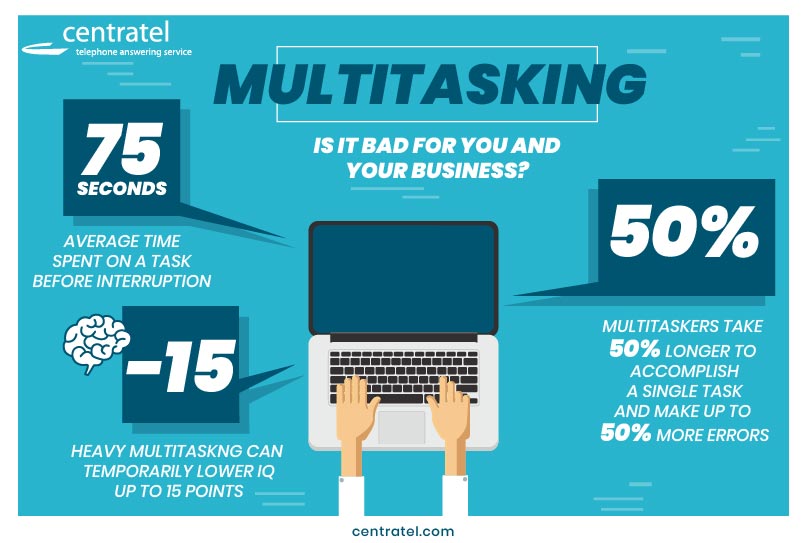
Think about what multi-tasking means. The ability to move through your day, juggling assorted tasks to accomplish every item on your to-do list. Now, think about it in terms of your employees.
Does the image of people doing several things at once give you confidence in their abilities, or cause concern?
This article looks at how our brains function, shedding light on the much-touted phenomenon of multi-tasking and its effects on productivity.
You’ll read about the realities of what happens when people spend hours bouncing from task to task, feeling mounting pressure and a potential meltdown. Discussion includes the potential pitfalls of multi-tasking in the workplace, be it contracting, homecare, or in property management.

Why is Multi-tasking an Important Workplace Topic?
Many workplace functions have become more efficient and streamlined because of technology. Multiple platforms pave the way for being able to reply to an email while cruising a website or taking calls. Added to this is the ability to conduct work tasks in multiple settings because of mobile devices and ready access to internet connections. These factors contribute to vital questions for managers:
- How did multi-tasking become a workplace consideration?
- Does the ability to multi-task affect a person’s work performance?
- What steps can a business take to assure quality and productivity?
The answer to each of these questions reveals reasons for reviewing practices within your business, including the benefits of contracting with a quality answering service.

Multi-tasking as a Workplace Phenomenon
Multi-tasking existed prior to today’s advanced technology and it’s multiple opportunities to juggle tasks.
- Think of an administrative assistant answering calls while typing notes.
- Or the contractor giving his crew directions while he’s installing wiring.
These multi-tasker types appeared efficient to others who envied their ability to seemingly accomplish so much. This is how multi-tasking became a valued workplace ability. People who managed multiple functions simultaneously added this skill to their resumes and talked about it during interviews. It became a sought-after quality until recent years.
Business leaders and others started to question the value of multi-tasking. They inquired if this ability was measurably linked with efficiency.
- Were there quality outcomes associated with this skill?
- Was it okay for people to eat at their desk, sitting there for hours on end?
- Or, as some suspected, did the practice actually result in errors?
The answers to these and other questions led to fresh insights about humans, our brain’s structure, and when we function at optimal performance.
Why is Multiple-tasking a Concern for your Business?
Chances are you tried juggling balls or rings at one time or another. Some people are good jugglers, while the rest of us give up, finding it better to watch true talent. When we do, what do we see? Besides the physical abilities, we witness focus, highly visible concentration. Therein is the first insight about concerns that can arise when one multi-tasks.
The bottom line is that the human brain works and learns best focusing on one thing at a time. We’re actually wired that way. Neuroscientists have determined that multi-tasking limits your best thinking. Only 2.5 percent of humans can multi-task without losing quality. That means the chances are slim that you or one of your employees belong to this specialized group.
The rest of us need to learn to live with the reality that our brains work most effectively when we do one thing at a time. Much the same can be said for our bodies! Think of the last time you had too much on your mind as you moved through multiple tasks, juggling calls with work reports. Chances are your breathing became shallow, your neck and shoulders tightened, and your stomach churned. Even if it was only one of these, it was more than enough. You were feeling stress hormones at work.
The issues with ongoing multi-tasking is that when those stress hormones, including cortisol, become elevated they contribute to:
- Sleep disruption,
- Anxiety and irritability,
- Immune system issues, and
- The exhausting experience of sluggish, clouded thinking.
These concerns become workplace issues when multi-tasking’s negative effects cause lowered efficiency, customer dissatisfaction, mistakes, absenteeism, and a reduction in employee morale. It interferes with short-term memory, making it especially hard to return to an interrupted task. Along with thinking of these concerns for your own business, reflect on how stress affects your employees, especially as business grows.

Improve Performance and Satisfaction
Although your staff has done well keeping pace with work and social changes, it’s time to take steps to maintain the high-performance standard you’ve established. You’ve come to realize that continually shifting from answering the phone, to sending an email, or giving someone directions is detrimental to employees’ work performance, well-being, and job satisfaction.
- Now’s the time to institute changes that improve each staff person’s ability to focus.
- There are a number of options to consider.
- The question is: Which offers the best return on investment (ROI)?
As you contemplate ways to internally limit multi-tasking, audit the amount of time staff spend juggling calls and emails. One solution is to contract with a high-quality answering service, especially as your business responds to increasing client interest. Consider these points as you look into the service that best meets your needs with:
- Around the clock responsiveness, regardless of client location.
- Agents/operators who excel because their primary task for your business is to professionally answer the phone and convey messages.
- Adherence to confidentiality standards, including those associated with technology.
Along with instituting a business relationship with an answering service, there are low-cost interventions to boost focus and limit multi-tasking.
- Encourage staff to take breaks away from workstations. Spots with comfortable seating or walking areas offer a change of pace.
- Offer tips on simple stretching to release tension and boost productivity.
- Explore the art of mindfulness that aids in clearing one’s mind of accumulating clutter.
- Natural lighting and views of outdoor spaces help to reduce mistakes by promoting a sense of well-being.
The best group to turn to for ideas on how to eliminate multi-tasking is your staff. They’ll be grateful that their well-being is as meaningful to you as are quality service and productivity.
One of the most worthwhile ways to reduce multi-tasking as you improve customer satisfaction is by contracting with the highest quality answering service available. One that effectively represents your business as it professionally responds to client calls.
